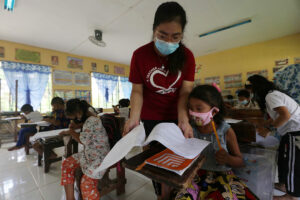EU, PHL to restart free trade talks

THE PHILIPPINES and the European Union (EU) are exploring the resumption of negotiations for a free trade agreement (FTA), which have been stalled since 2017.
President Ferdinand R. Marcos, Jr. and European Commission (EC) President Ursula von der Leyen made the announcement after a meeting in Malacañang on Monday.
“I welcome the conduct this year of scoping exercises between the European Commission and the Philippines towards negotiations for a Philippines-EU free trade agreement,” Mr. Marcos said in a speech. “The Philippine government experts will work with the European Commission in achieving a bilateral FTA.”
Ms. Von der Leyen said a team will start working to “set the right conditions so that we can get back to the negotiations.”
The EU and the Philippines will now start a bilateral “scoping process” where they will assess to which extent they share a mutual understanding on the future trade deal.
Once the scoping process is concluded and after consultations with EU member-states, the EU and the Philippines would then be able to resume negotiations.
Trade Secretary Alfredo E. Pascual said the scoping process will start in September.
“The target is to complete it before the end of the year so that the formal negotiation of the FTA should follow suit. Hopefully by the start of the new calendar year, 2024,” he told reporters on the sidelines of a forum in Makati City on Monday.
The EU and the Philippines began exploratory talks for an FTA as early as 2013. Official negotiations for the target trade deal were launched in December 2015, with the first round taking place in May 2016.
Since 2017, talks have been stalled over issues related to intellectual property rights and data exclusivity, among others.
Ms. Von der Leyen said a Philippines-EU free trade deal has “huge potential” for the countries in terms of economic growth and job creation, adding that it could also be a “springboard for a new technology cooperation to modernize the broader economy.”
“The EU is already your fourth-largest trading partner, and we are the first foreign investor. But we can do so much more,” she said. “So I’m very glad that we have decided to relaunch negotiations for a free trade agreement.”
Bilateral trade between the Philippines and the EU reached €18.38 billion in 2022.
Citing economic dependencies, Ms. Von der Leyen said there’s a need for them “to diversify our supply lines and make them resilient.”
“This is a lesson we have learned and that is what we call ‘derisking’ our trade relations,” she said. “An FTA is the basis for that.”
The move signals EU’s intent to boost strategic engagement with Southeast Asia, whose growth is “burgeoning,” the European Commission said in a statement on its website.
A possible comprehensive FTA with the Philippines would cover “ambitious” market access commitments, effective sanitary and phyto-sanitary procedures, and intellectual property rights protection, it said.
“Sustainability will also be at the heart of this agreement, with robust and enforceable disciplines on Trade and Sustainable Development (TSD),” it said.
“These will be in line with the Commission’s TSD review Communication of June 2022, supporting high levels of protection for workers’ rights, for the environment, and the achievement of ambitious climate goals.”
Currently, the Philippines is enjoying trade perks under the EU’s Generalized Scheme of Preferences Plus (GSP+), which is set to expire in December.
The GSP+ allows the Philippines to enjoy zero tariffs on 6,274 products or 66% of all EU tariff lines. Some of the top Philippine exports to the EU under the trade scheme are crude coconut oil, vacuum cleaners, prepared or preserved tuna, hairdressing equipment, and prepared or preserved pineapple.
CLIMATE CHANGEMeanwhile, climate change was also discussed during the meeting between Mr. Marcos and Ms. Von der Leyen, with the two leaders touting the signing of a bilateral agreement on the Joint Declaration on the Green Economy Program, which would provide Manila with a €60-million grant to pursue efforts under the green economy.
Mr. Marcos said the grant would help Philippines efforts in the areas of circular economy, renewable energy, and climate change mitigation.
Ms. Von der Leyen said the EU also wants to help the Philippines boost its early warning systems, citing a plan to set up a so-called Copernicus data mirror site within the Philippine space agency.
“And we have just signed an agreement to boost the flow of Earth observation data,” she added. “Between us this is very important for early warning, for example, for extreme weather phenomena and to improve climate resilience. This is the first in-space cooperation in Asia.”
The European Commission president said they also discussed the EU’s commitment to help Manila become a digital hub in the region, noting that the EU will launch a digital economy package for the Philippines this year.
“We will work together on fast and reliable connectivity with submarine cables on cybersecurity training, and on deployment and development of 5G,” she said.
Ms. Von der Leyen said the EU is also working on a possible extension of a submarine cable that they plan to build between Europe via the Arctic seabed to Japan.
“This cable could go all the way down to Southeast Asia. And we believe that it could go via the Philippines that would give you a strategic position on an infrastructure that could be instrumental both for your prosperity and national security,” she said. “We will stay in close contact on this.”
She said the EU also wants to boost its partnerships with the Philippines for critical raw materials, which she said are needed for a “clean and digital future.”
“Our existing partnerships on critical raw materials do not only invest in extraction, but across the whole value chain,” she added. “We share technology and knowledge. We train the local workforce, and we empower local communities and of course, we abide by the highest and environmental standards.”
However, Human Rights Watch European Director Philippe Dam lamented the lack of discussion on human rights during Ms. Von der Leyen’s meeting with Mr. Marcos.
“It’s very concerning that Commission President von der Leyen could not be heard tackling human rights and civil liberties issues,” Mr. Dam said in a statement. “Make no mistake – the human rights situation in the Philippines remains dire. The EU should not look the other way and should tie a future trade deal to concrete labor and human rights improvements and accountability for past violations.”
Under the EU’s GSP+ scheme, the Philippines is required to uphold commitments to 27 international conventions on human rights, labor, good governance and climate action. — Kyle Aristophere T. Atienza with inputs from Revin Mikhael D. Ochave




